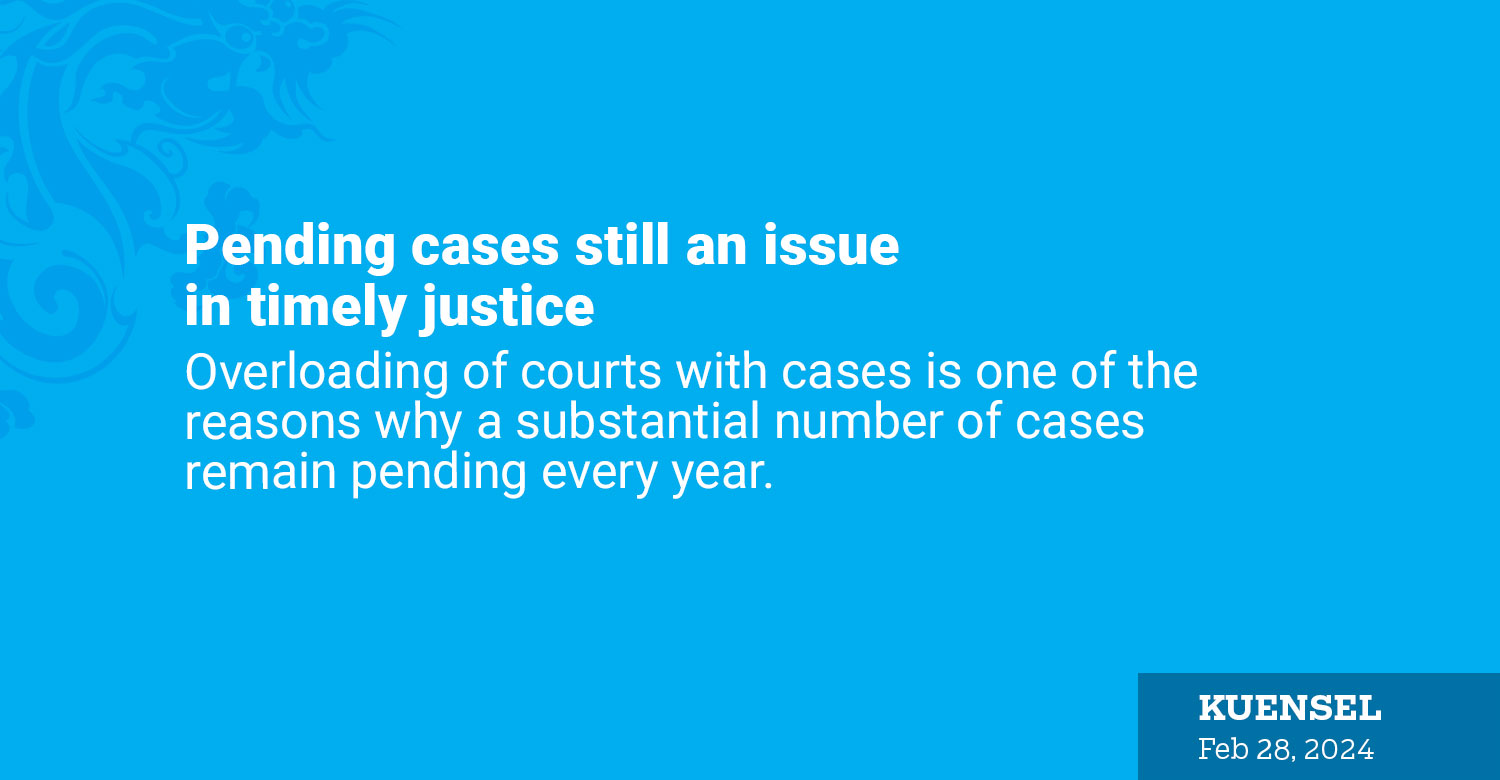… despite numerous improvements
Thinley Namgay
Overloading of courts with cases is one of the reasons why a substantial number of cases remain pending every year.
This is one of the primary challenges for courts in ensuring timely court proceedings. Many view that delays in court proceedings hamper the livelihood of citizens, especially farmers who are sustaining on meagre sources of income.
The 2023 annual judicial report recorded 1,621 pending cases. Although the numbers have dropped by 158 compared to 2022, 179 of the total cases have been pending for more than a year.
Before 2023, the number of pending cases was 2,692 in 2019, 2,873 in 2020, 1,806 in 2021, and 1,779 in 2022.
The focal person at the Media and Communication Unit of the Judiciary, Leki Tshering said that the complexity of investigation and fact-finding also leads to pending cases.
He said certain cases necessitate thorough investigation and fact-finding processes due to their inherent complexities. “This often involves reliance on forensic reports and verification procedures conducted by relevant authorities such as the RBP.”
One factor for a case pending he shared was adjournment in civil cases where parties involved in civil cases request adjournments, which prolongs the legal process.
Courts typically grant adjournments in cases of unavoidable circumstances such as personal illness or family bereavement.
Leki also said that the absconding of parties, especially in civil cases, also leads to a case pending.
Of the 1,621 cases pending in 2023, 437 are in drungkhag courts, 985 in dzongkhag courts, and 49 in the High Court and 70 cases in the Supreme Court.
Of the 179 pending cases beyond 12 months, 76 are in drungkhag courts, 54 in dzongkhag courts, and one in the Supreme Court. While the High Court has no pending cases beyond 12 months.
Transformation in the judiciary for effective service
Leki Tshering said the implementation of strategic mechanisms, Guideline on Expeditious Adjudication Proceedings is in place. “This guideline underscores the importance of expeditiously handling pre-trial processes, judicial proceedings, and enforcement of judgments.”
He said the implementation of e-litigation represents a significant stride forward for the judiciary in leveraging technology and facilitating equitable access to justice for residents of remote rural areas.
Last year new courts were incepted in Paro, Gasa, and Sakteng towards ensuring fair and equitable access to justice.
Judiciary personnel were formally delinked from the Royal Civil Service Commission in February last year, which is crucial to establishing independent human resources.
As per the judicial report, a pivotal change entails the presiding of the Chief Justice of the High Court over all Benches, a strategic move towards consistency and centralised leadership. In addition, a system has been instituted, mandating the periodic alteration of Justice compositions within Benches every three to four years for better transparency, accountability, and collaboration.
To ensure user-friendly access to justice for litigants, an SMS alert system has been introduced so that the litigants receive real-time information about the relevant Bench, the dealing Bench Clerk, and the lead Justice overseeing their case.
The High Court also adopted an innovative approach towards litigation costs. In instances where appeals are dismissed, upholding the judgment of the trial court, an imposition of one to three months of the minimum wage as litigation cost has been introduced.
“This pragmatic measure serves not only as a financial deterrent to frivolous appeals but also underscores the court’s commitment to maintaining the sanctity of the legal process,” the report stated.
Overview of case reports of 2023
The Judiciary in total registered 9,837 new cases in 2023 with 1,773 cases pending from 2022. Of this, the Judiciary disposed of 85.30 percent of the cases.
Drungkhag courts recorded 2,019 new cases in addition to 384 cases forwarded from 2022. The courts solved 81.8 percent of the total cases, of which 4.12 percent were appealed to dzongkhag courts.
While the dzongkhag courts registered 6,981 new cases tallying to 1,132 remaining cases from 2022. The court completed 86.78 percent of the cases, of which 6.55 percent were appealed to the High Court.
The Time-Bound Bench registered 41 new cases in addition to 53 pending cases from other courts. Of that, the Bench decided 14.89 percent of cases.
The High Court registered 547 new cases in 2023 in addition to 65 unresolved cases from 2022. Of that, the court concluded 91.99 per cent of the cases with no cases pending beyond 12 months. Of 563 cases decided, 39.78 percent appealed to the Supreme Court.
The Supreme Court had 139 cases pending with 249 new registrations in 2023. The court decided 81.95 percent of cases.


